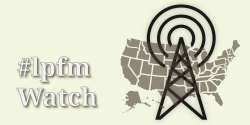Updated with quote from CHIRP General Manager Shawn Campbell, below.
Just eight more low-power FM construction permits were issued in the last week, bringing the total to 1,476.
Yesterday Matthew reported on the new LPFM station bringing an interesting mix of alternative and public bilingual programming to Bisbee, AZ. There are two more new stations of note in this batch.
CHIRP Taking to the Chicago Airwaves
The Chicago Independent Radio Project completes a seven year journey to bring community radio back to the FM dial of the Windy City. The group received its construction permit from the FCC on Wednesday after a competing applicant, the Des Plaines Police Department, asked the Commission to dismiss its application.
CHIRP, as it is better known, was started by staff from Loyola University’s WLUW-FM. That station had been operated as a community station under an agreement with Chicago Public Radio from 2002 until 2007, when Loyola ended the agreement, taking back control of WLUW in 2008 and integrating it into its revitalized School of Communication. (Jennifer toured WLUW back in 2012.)
CHIRP launched its online station in January 2010. Led by founder and general manager Shawn Campbell, CHIRP was a vocal proponent for the Local Community Radio Act, the passage of which ultimately paved the way for big urban centers like Chicago to have LPFM stations, after being cut out of the first LPFM licensing window in 2000.
By email, Campbell told us:
“We’re thrilled that after more than seven years of working on this issue, CHIRP finally will get to build its broadcast operation at 107.1 on the north side of Chicago. I feel like we’re proof that people really can make a difference.
We had to change the law at the federal level even to get a chance to apply for this license, but none of our people ever got discouraged or gave up. And this isn’t just a triumph for us — there have been hundreds of new LPFMs across the country that have been licensed, including, for the first time, new stations in big cities. We’re really proud that we were a part of making that happen.
We have an amazing group of 250+ volunteers, some of whom have been with us since day one, and they are incredibly committed and hardworking. And finally, I think this is a real testament to the fact that radio’s demise has been greatly overstated. From the time we started CHIRP, there’s been such strong, passionate community support. People have spoken with the volunteer time, their dollars, and their general enthusiasm for the idea of building a truly independent radio station for Chicago.
I lived in Chicago from 2008 to 2013, and got to witness the birth and early growth of CHIRP. The staff and volunteers of the station worked hard to make it a strong presence in the city’s independent music scene, giving the new broadcast station a very firm foundation to build upon.
It’s particularly great to see that CHIRP will be able to transmit from its home base in the North Center neighborhood, giving its signal a pretty good footprint in Chicago’s north side, where many popular music venues are located.
Dueling Petitions Result in One Winner in Nevada
The Pahrump Film Festival, in Pahrump, NV, was granted a construction permit on Tuesday after the FCC dismissed a competing application in its MX group. In this case the FCC was acting on a petition to deny filed by Film Festival, culminating an interesting back-and-forth between the applicants and the Commission.
Film Festival claimed that the other applicant, the Albert Partlow Science Foundation, listed as its headquarters an address where,
“there are no buildings, mail receptacles, utilities, pavement, on the entire street. It is undeveloped barren desert.”
The group also said that “none of the officers, directors, [or] trustees,” reside in Parhrump, NV, noting that FCC rules require a rural LPFM’s principals live within 20 miles of the proposed tower site.
In a reply Partlow claimed that the address served as a legitimate campus, with the land “offered to local astronomers and educational groups to aid in their research.” The group’s board president acknowledged residing in Watauga, TX temporarily, but argued that because the group is incorporated in Nevada, the lack of a local board member is unimportant. Partlow then made its own counter-claims against Film Festival, telling the Commission that the competing group had board members in common with another applicant in Pahrump, in violation of LPFM rules.
Then, in a strange turn, in July an engineer working for Parlow filed an amendment to change its frequency in order to move out of the MX group. That amendment turned out to be defective, because it did not obey minimum spacing requirements. Afterward Parlow filed a petition asking to reinstate to the first frequency, telling the Commission that their engineer had filed the amendment without the group’s authorization.
In making its decision, the FCC determined that Parlow was indeed not eligible to have an LPFM license, rendering its amendments moot. The Commission found that “these two undeveloped parcels cannot be considered a ‘campus,’” because the group “does not offer courses or hold their own activities there.” It also found that Parlow had relied upon an outdated listing of Film Festival board members, confirming that at the time of its application Film Festival did not share board members in common with another applicant.
That was certainly one of the more curious stories I’ve encountered in this LPFM window.



